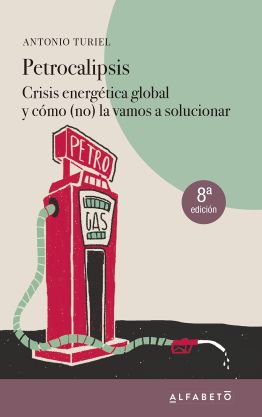Less when it was most needed: the energy crisis
- Dossier
- Oct 22
- 9 mins

In the midst of a changing world made more complicated by climate change, we must abandon the suicidal idea of perpetual growth on a finite planet and start talking about degrowth, relocation and rationalisation of cities. Because the planet cannot absorb all the waste we generate, nor can it provide us with all the energy resources we want to consume at a growing rate.
We have just experienced a scorching summer. This year we have seen a succession of heat waves, and not just since the beginning of summer: the first two happened in spring. The problem of climate change is clear to most of the population, which is part of the global change the planet is being subjected to owing to thoughtless and over-reaching human action. The terrible price that is being and will be paid because of this increasingly severe weather is also obvious to the majority of the population: deaths from heat waves, forest fires, poor harvests, not to mention bankruptcies... And what we can only suspect is still to come: the Mediterranean at 6°C above average values can only mean heavy storms during the autumn and at the end of the year.
Faced with this colossal challenge, how have we responded over all these years and how will we respond to the greatest existential risk to the human species’ continuity on the planet? Are big cities, such as Barcelona, prepared to tackle this challenge? And if not, what should they do?
Our response has been poor thus far. In the midst of this evident and inexcusable climate emergency, the European Union’s response has been disappointing: first, in January it declared that nuclear energy and gas fall under green taxonomy. But in May the response was even worse: the Commission approved the REPowerEU package, with all EU member states voting in favour, which envisages increasing coal consumption (the fuel that emits the most CO2 per unit of energy produced) by 5% compared to current levels. This decision may not seem so serious, but it actually is for two reasons. Firstly, because in the European Union today coal still accounts for 14% of all primary energy consumed and is a major resource in some countries such as Poland. And secondly, because according to the Intergovernmental Panel on Climate Change (IPCC) Working Group III (Mitigation) AR6 report, published in April 2022, all gas and coal-fired power plants should be shut down by 2030 to avoid catastrophic global warming. To add fuel to the fire, the REPowerEU plan states that this increase in coal consumption will be “temporary”: just fifteen years. That is, until 2037, seven years beyond the limit foreseen to avert catastrophe.
Our CO2 emissions are 30% higher than those reported, if the emissions associated with our consumption of products from China are taken into account.
I am often asked these days: what about the energy transition, what about the desire to decarbonise society, have we given up the fight against climate change? This brings us to another question: what have we done in recent years to combat climate change? And the answer is simple: nothing or virtually nothing. Despite all the rhetoric on the table, the world’s greenhouse gas (GHG) emissions have grown steadily in recent decades; they increased only slightly less during the 2008 economic crisis and the months of the lockdown owing to the Covid-19 pandemic in 2020. All the purported improvement in EU GHG emissions has been brought about by outsourcing the most polluting activities to China, so that CO2 emissions would be recorded there. In addition, total emissions are rising due to the shipping of raw materials and processed products to China. A recent assessment of the actual CO2 footprint showed that our emissions are 30% higher than those reported, if the emissions associated with our consumption of products from China are taken into account.
So does this mean that the transition to renewables is futile? Shouldn’t this lack of real and radical changes in GHG emissions spur an increase in renewable energy installations? No, it shouldn’t. Because, although it is not acknowledged, renewables on a massive scale are not economically competitive, and the only thing that matters here – and has always mattered – is economics. We will not do anything that harms the economy, and the propagated renewable transition model does not allow us to maintain an ever-growing economic system, which is the foundation of our capitalist system. It is not that electric renewables (the only ones being talked about, as if there were no other renewable energy models) are useless: they have their niche, their range of applications and their window of contribution. But it is totally unrealistic to suggest that electric renewable energies will replace all current energy consumption and that we will continue to do things the way we do them now. Critical materials are lacking to bring the rollout to fruition on the scale that would be needed; fossil fuels are in short supply too, and it is not always easy to harness electricity. Here’s the crux of the matter: regardless of how much we are led to believe that we will all have electric cars, it will not be viable for a myriad of reasons, starting with the shortage of battery materials. Green hydrogen is even worse as an energy carrier: it is difficult to handle, it also requires a great deal of scarce materials and the energy losses of converting electricity to hydrogen are prohibitive, so much so that the IPCC’s own Working Group III report claims that hydrogen technology has not reached maturity for mass deployment.
Does this mean that we are condemned to a relentless increase in CO2 emissions to prevent putting a stop to this crazed, ecocidal and suicidal economic system? If it were up to the economic system, no doubt. But it is no longer only up to it. In this religion of growthism that they want to pass off as “economic theory”, it is not considered that the planet imposes biophysical limits, because, although it is enormous, it is still a round ball and, therefore, finite. Devotees of the Church of Our Lady of Perpetual Growth are incapable of understanding that not only can’t the planet absorb all the waste we generate, but also that it cannot give us all the resources we wish to consume at a growing rate.
 Illustration. © Susana Blasco / Descalza
Illustration. © Susana Blasco / DescalzaThe doctrinal obfuscation of the above church’s devotees is such that they do not understand a basic concept such as peak oil, even though it is right under their noses. The reader unfamiliar with the concept will wonder what peak oil is. Let us explain it with a simple example. A person has some apple trees. They pick the apples, starting with the ones hanging from the lowest branches. Their apples are so good that they start giving them away, making pies... They have worked out how many apples the apple trees have, and they have enough to last the whole autumn. But what they haven’t calculated is that it’s getting harder and harder to pick them. The apples are indeed there, but they are on higher branches, in places that are more difficult to reach or even to find. They have to try harder and harder to get the apples, and at a certain point they begin to see no point. In the end, they harvest fewer and fewer apples, only those they can pick with a reasonable amount of time, and they simply do less and less with them.
There is no more profitable oil left in the world: some small deposits are still being discovered and exploited, but for decades only five billion new barrels are found each year, whereas we consume 36 billion barrels.
The same thing happens with oil. Despite technical improvements introduced over the decades, the oil that remains is increasingly harder to extract, is more expensive and is of poorer quality. This has been known for 50 years, when geophysicist Marion King Hubbert first said so. However, with improvements in exploration and extraction, oil availability continued to increase every year until 2005, around the time Marion King Hubbert had predicted in 1970. At that time, conventional crude oil production peaked; since then, it has not risen any further and is dropping faster and faster. To offset this decline, many other substances have been introduced: unconventional oils, imperfect substitutes. But these unconventional oils also have their limits and are more expensive to produce. Worse still, the oil companies are losing money, hand over fist. That is why, since 2014, the world’s oil companies as a whole have cut spending on searching for and exploiting oil fields by 60%. There is no more profitable oil left in the world: some small deposits are still being discovered and exploited, but for decades only five billion new barrels are found each year, whereas we consume 36 billion barrels. Since 2018, total oil production (conventional and non-conventional) has fallen, and has already dropped by 5%.
There is an oil shortage, but there is also a lack of investment in refineries for the same reason: because oil companies will not be able to make the investment profitable. This makes some fuels more difficult to produce and affects diesel and paraffin in particular. Diesel production is falling faster than oil production: we are already 15% below 2015 levels and it is getting worse. And diesel is the lifeblood of the system: all machinery runs on diesel. We are seeing problems in many countries, across all sectors: transport, mining, fishing, agriculture...
The problem of falling production is not just in oil. Coal peaked in 2019, although production is still on an undulating plateau. Uranium is in a worse situation: it peaked in 2016 and production has already fallen by 24% – do we now understand why half of France’s nuclear power plants are closed? As for natural gas, production has not yet peaked, but almost, and for Europe it is already as if it had peaked.
All this was happening before the war in Ukraine: it was the cause behind the high prices in late 2021. The war has only accelerated this process. When it ends, hopefully soon, we will not go back to what was there before: we will simply have gone further down the spiral of energy decline and environmental degradation.
Does this mean we cannot do anything? Of course not. First of all, we must abandon the suicidal idea of perpetual growth on a finite planet. We must start talking about degrowth. Relocation. Rationalisation of cities. Urban and peri-urban vegetable gardens. The infrastructures we will need when we have no cars. How we will transport goods without so many lorries. And we will have to do all this in the midst of a changing world made more complicated by climate change. A world in which we want to live and that we will have to make much more habitable than it is today. When will we start talking about it?
Recommended publications
 El otoño de la civilizaciónJuan Bordera i Antonio Turiel. Revista Contexto, 2022
El otoño de la civilizaciónJuan Bordera i Antonio Turiel. Revista Contexto, 2022 PetrocalipsisAlfabeto, 2020
PetrocalipsisAlfabeto, 2020
The newsletter
Subscribe to our newsletter to keep up to date with Barcelona Metròpolis' new developments




